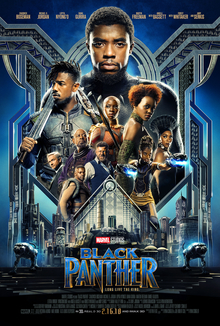‘Black Panther’ Pounces Above Box Office Competition with Unprecedented Diversity

March 4, 2018
Black Panther, released Friday, Feb. 16 all over the country, earned just over $200 million in its opening weekend alone, and for good reason. The film combines the colorfulness we’ve come to expect from Marvel movies with action-packed fight scenes and amazing technology — not to mention the starring an amazingly diverse cast that is rare in Hollywood today.
The secretive yet high tech world of Wakanda comes to life through its combination of traditional African structures and advanced skyscrapers. The whole movie is loaded with amazing technology, (think completely bulletproof cars, instantaneous healing tech, etc.) the likes of which are mostly invented by Princess Shuri, T’Challa’s kid sister.
What made Black Panther stand out from previous Marvel movies was the characters. Each major character (T’Challa, Nakia, Killmonger) has a different arc that challenges how they think of themselves as members of their society — T’challa struggles with the throne and how to move on from his father’s reign, Nakia searches for a way to satisfy both her desire to help her people and follow her heart, and Killmonger faces the struggle of trying to belong in a country that doesn’t seem to want him but which he longs to be a part of. I have never seen a film in which all of the major players had as reasonable motivations as those in this film. Every action had a purpose that the audience could understand, which makes Black Panther not only enjoyable for those who religiously watch comic book movies but also those who have never seen a superhero on the silver screen ever before.
The film also featured diversity that was evident from the release of the trailer. Often in Hollywood, characters get ‘whitewashed,’ meaning characters meant to be played by people of color get portrayed by white actors instead. Controversy has arose surrounding movies like Ghost in the Shell, Aloha, and Exodus: Gods and Kings, due to their use of white actors in roles traditionally written to feature a diverse cast, so it’s refreshing seeing African people being played by people of color.
The music alone showed the difference in culture throughout the film. In the beginning, before the introduction of Killmonger, the music was heavily influenced by traditional African music; it was heavy on the drums and had no synthesized sounds whatsoever. When the movie transitioned and began to more heavily focus on Killmonger (a man born and raised in Oakland) the music shifted to feature artists like Kendrick Lamar, Khalid, and The Weekend. This helped to emphasize not only the differences in culture between our protagonist and antagonist, but also added a nod to current popular artists.
While many expected the movie to build up for Avengers: Infinity War, Black Panther — except for a brief after credit scene — did not set the stage in any way. There was no mention of the infinity stones, and only a single nod to the death of T’Chaka in Captain America: Civil War, which heavily contributed to the major plot points within the movie.
Black Panther is a phenomenal movie for so many reasons; it has set records in the box office and in the cast list as the first major motion picture to have people of color as a vast majority. Its music accentuated the differences between T’Challa and Killmonger. The visuals are bright and colorful, and the messages are clear and extraordinary profound. Seeing this movie is a must for everyone — snag tickets while you still can.


